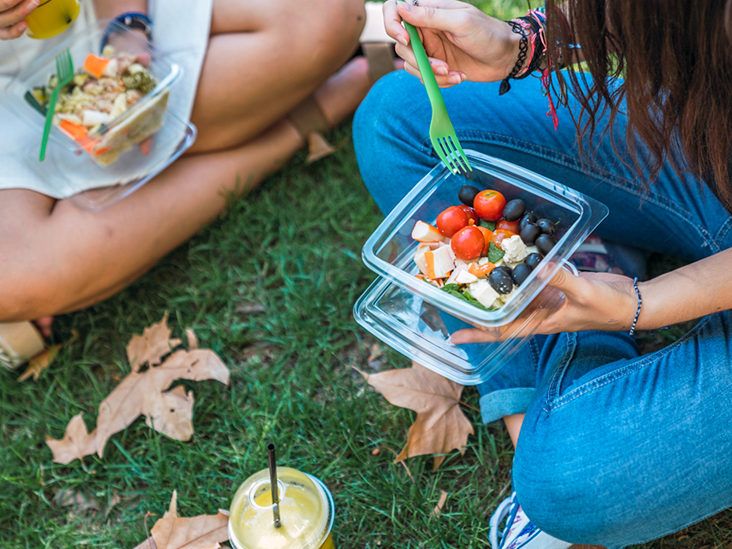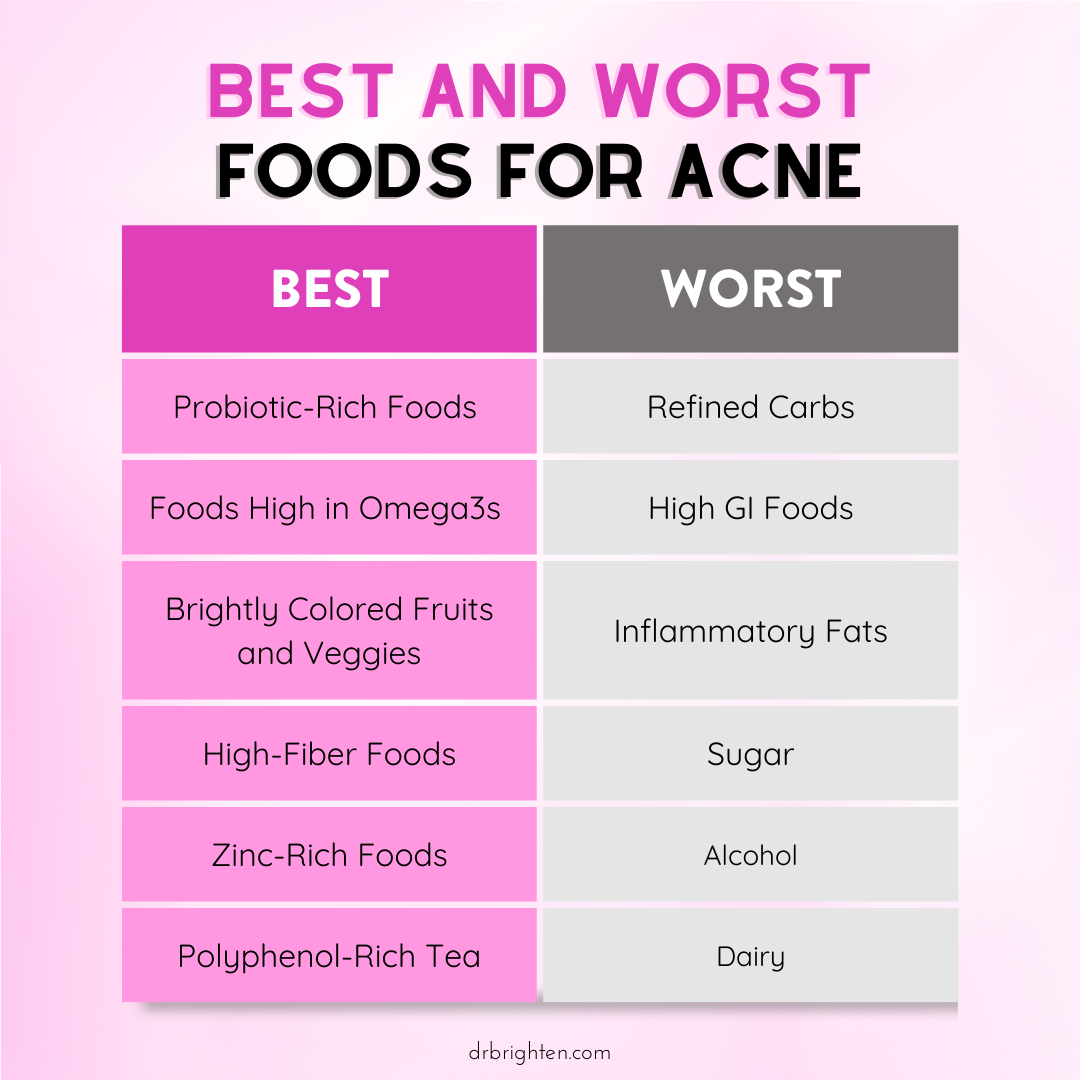To improve acne through diet, focus on eating whole foods and reducing dairy and sugar intake. Incorporate a variety of fruits, vegetables, and lean proteins to support skin health.
Acne can be a persistent and frustrating condition, affecting not just teenagers but adults as well. While topical treatments and medications are commonly sought after, dietary adjustments offer a complementary approach to managing breakouts. Understanding the connection between what we eat and the health of our skin is crucial.
Certain foods are known to exacerbate acne, while others can help calm inflammation and reduce breakouts. A balanced diet rich in antioxidants, low in processed foods, and attentive to individual food sensitivities can be a powerful tool in achieving clearer skin. By adopting a mindful eating strategy and paying close attention to how your skin reacts to different foods, you can tailor a diet that helps mitigate acne issues.
Introduction To Acne And Diet
Acne often brings a sense of frustration for many. While skincare routines help, diet plays a vital role too. Understanding how what we eat affects our skin is crucial. This section explores the impact of nutrition on acne.
The Link Between Skin Health And Nutrition
Nutrition is a cornerstone for healthy skin. Certain foods can trigger or worsen acne, while others can protect and clear your skin. Vitamins, minerals, and antioxidants in our diet directly influence the health and appearance of our skin.
- Omega-3 fatty acids can reduce inflammation.
- Zinc helps heal the skin and reduce breakout severity.
- Probiotics balance gut health, affecting skin clarity.
Common Myths About Acne And Food
Many believe chocolate or greasy foods cause acne. This is not entirely true. It’s not about oily foods but rather the type of oils consumed. Trans fats are bad, while omega-3s are good for skin health.
| Myth | Fact |
|---|---|
| Chocolate causes acne. | It’s the sugar and dairy in chocolate that might be culprits. |
| Fast food triggers acne. | It’s about the poor nutritional quality, not just the grease. |
| Acne is just for teens. | Adults can suffer from acne too, often due to diet and stress. |

Credit: www.healthline.com
Identifying Acne Triggers In Your Diet
Struggling with acne can be a frustrating experience. Many factors contribute to breakouts, and diet plays a significant role. Understanding what foods may trigger acne is the first step to clearer skin. Let’s dive into how certain foods can affect your complexion and how to pinpoint those that might be causing you trouble.
Foods That May Worsen Acne
Some foods can lead to breakouts. Let’s explore these:
- Dairy Products: Milk and cheese might cause pimples.
- High-Glycemic Foods: These are sugary snacks and white bread.
- Fast Food: Burgers and fries could make skin worse.
- Chocolate: It’s sad but true; chocolate might not be skin-friendly.
- Nuts: While healthy, some nuts might trigger acne for certain people.
How To Track And Identify Triggers
To find out what causes your acne, keep a food diary.
- Write down everything you eat.
- Note any skin changes daily.
- Look for patterns over several weeks.
Use a table to help you track:
| Date | Food Intake | Skin Condition |
|---|---|---|
| April 1 | Yogurt, Oatmeal, Apple | No new breakouts |
| April 2 | Pizza, Soda | Two new pimples |
After tracking for a while, compare notes. You might see which foods to avoid. Remember, everyone is different. What affects one person may not affect another. Patience and observation are key.
Key Nutrients For Acne Prevention
Everyone wants clear skin. What you eat can help you fight acne. Let’s talk about key nutrients that help prevent acne.
Vitamins Crucial For Skin Health
Clear skin starts with these vitamins:
- Vitamin A: Keeps skin smooth and rejuvenated. Find it in sweet potatoes, carrots, and spinach.
- Vitamin E: Protects skin from damage. Eat almonds, sunflower seeds, and avocados.
- Vitamin C: Makes collagen and heals skin. Oranges, strawberries, and bell peppers are great sources.
- Vitamin D: Fights infections, including acne. Get it from the sun or eat salmon, fortified foods.
Minerals That Fight Acne
These minerals are acne’s enemies:
| Mineral | Benefits | Food Sources |
|---|---|---|
| Zinc | Reduces oil and kills acne bacteria. | Beans, nuts, whole grains. |
| Selenium | Defends against oxidative stress. | Seafood, eggs, brown rice. |
| Magnesium | Calms skin and reduces redness. | Leafy greens, yogurt, bananas. |
The Role Of Hydration In Skin Care
Clear skin starts from within. Proper hydration plays a key role in a healthy complexion. Drinking enough water supports your body’s natural detox processes. This helps keep your skin clean and clear. Let’s dive into how water intake directly impacts skin hydration and acne.
Water Intake And Skin Hydration
Keeping your skin supple and plump starts with water.
- Water helps maintain skin’s elasticity.
- It reduces the appearance of fine lines.
- Hydrated skin is less prone to flakiness.
Aim for eight 8-ounce glasses of water daily. Your skin will thank you!
Effects Of Dehydration On Acne
Dehydration can wreak havoc on your complexion.
| Dehydration Impact | Effect on Skin |
|---|---|
| Increased Oil Production | Leads to clogged pores and breakouts. |
| Slows Down Detox | Toxins build up, causing acne. |
| Irritated Skin | Redness and inflammation get worse. |
Make sure to stay hydrated to minimize these issues. Your skin’s health depends on it.
Probiotics And Skin Health
Clear skin starts from within, and what you feed your body matters. A growing body of research suggests that probiotics, the good bacteria in your gut, can be powerful allies in the battle against acne. Let’s explore how these tiny organisms contribute to skin health and which foods are the best sources.
Understanding The Gut-skin Connection
The gut-skin axis describes how the gut and skin communicate. Healthy gut flora may reduce inflammation and production of certain skin oils. This can help improve acne. A balanced diet with adequate probiotics plays a crucial role in maintaining this harmony.
Best Probiotic Foods For Acne
Integrating probiotic-rich foods into your diet can help manage acne. Here are some top choices:
- Yogurt: Look for live active cultures.
- Kefir: A fermented milk drink full of probiotics.
- Sauerkraut: Fermented cabbage also offers fiber.
- Kimchi: A spicy Korean dish with diverse microbes.
- Miso: A Japanese seasoning made from fermented soybeans.
- Tempeh: Fermented soy product with a nutty flavor.
- Pickles: Fermented cucumbers, but choose those in brine, not vinegar.
Remember to choose products with live cultures and avoid excess sugar, which can negate the benefits.
Foods To Include In Your Acne Diet
Clear skin starts with what you eat. Your acne diet plays a key role. Let’s explore foods that can help. They fight inflammation and guard your skin against breakouts. Ready to meet your new skin-friendly foods? Here they are.
Anti-inflammatory Foods
Eating foods that reduce inflammation can help your acne. Let’s look at some top choices:
- Omega-3 fatty acids: Find these in fish like salmon, chia seeds, and walnuts.
- Green leafy vegetables: Spinach and kale are full of vitamins.
- Berries: Blueberries and strawberries are not only tasty but also fight inflammation.
Antioxidant-rich Choices
Antioxidants protect your skin cells. They can help clear acne. Here are foods packed with antioxidants:
- Colorful fruits: Oranges, kiwi, and papaya have lots of vitamin C.
- Nuts and seeds: Almonds and pumpkin seeds are nutrient-dense.
- Whole grains: Quinoa and brown rice give you fiber and antioxidants.
Foods To Avoid For Clearer Skin
Clear skin starts with what you eat. Some foods can cause acne. Knowing which foods to avoid can help your skin.
High Glycemic Index Foods
Foods with a high glycemic index can make your skin worse. These foods raise your blood sugar quickly. This can lead to more acne.
- Bread – especially white bread
- Potatoes – like fries and chips
- Sweets – such as cakes and cookies
Eating these foods can make your skin oily. Try to eat less of these to help your skin.
Dairy And Acne Correlation
Dairy products can also cause acne for some people. It is due to hormones found in milk.
| Dairy Product | Common Problems |
|---|---|
| Milk | Can make skin oily |
| Cheese | May lead to breakouts |
| Ice cream | Might cause pimples |
Try using alternatives like almond milk or coconut milk. They are kinder to your skin.
Lifestyle Changes To Complement Your Diet
Improving acne involves more than just diet. Simple lifestyle changes can boost your skin’s health. Let’s explore how consistent skincare and managing stress through exercise can help.
Importance Of A Consistent Skincare Routine
Cleaning your skin every day is key. It removes dirt and oil that can clog pores. Use gentle cleansers that don’t irritate your skin. Here’s a basic routine:
- Wash your face twice a day.
- Use a mild cleanser suited to your skin type.
- Apply a light, oil-free moisturizer.
- Once a week, use an exfoliator to remove dead skin cells.
Remember, picking or touching your face often can spread bacteria and worsen acne. Keep your hands away from your face.
Exercise And Stress Reduction Techniques
Regular exercise can reduce acne. It increases blood flow, sending more oxygen to your skin cells and carrying away waste. Exercise also helps reduce stress, which can trigger acne outbreaks. Try these activities:
- Brisk walking for 30 minutes a day.
- Joining a yoga class to improve flexibility and reduce stress.
- Swimming to cool and soothe your skin.
Besides physical activities, practice relaxation techniques like deep breathing or meditation to keep stress in check.
Together, a balanced diet, proper skincare, and stress management create a powerful defense against acne. Start these practices today to see clearer skin!
Creating A Personalized Acne Diet Plan
Acne can be a stubborn foe, but your diet is a powerful ally in the battle for clear skin. Crafting a personalized acne diet plan tailors nutrition to meet your skin’s unique needs. Let’s create a roadmap for your dietary journey to healthier, acne-free skin.
Steps To Design Your Meal Plan
Designing your acne diet plan involves simple steps:
- Track what you eat to identify triggers.
- Focus on whole foods like fruits, vegetables, and lean proteins.
- Reduce sugar and dairy intake as they can aggravate acne.
- Stay hydrated with plenty of water throughout the day.
- Plan meals that incorporate acne-fighting nutrients.
Consulting With A Nutritionist
For the best results, consult a nutritionist. They offer professional guidance tailored to your skin. A nutritionist can:
- Identify dietary deficiencies impacting your skin health.
- Recommend supplements if necessary.
- Develop a personalized meal plan to combat acne.

Credit: www.healthline.com
Conclusion: Commitment To Change
Embarking on a journey to clear skin requires more than topical treatments. It demands a lifestyle transformation, particularly in your diet. The link between what we eat and acne is undeniable. Positive changes in your eating habits can lead to clearer skin.
Summary Of Dietary Impact On Acne
Research reveals certain foods can aggravate acne. High-glycemic foods, dairy, and saturated fats often contribute to breakouts. Conversely, low-glycemic foods, omega-3 fatty acids, and antioxidants can help manage and improve acne conditions. Understanding this relationship is crucial for anyone seeking clearer skin.
Encouragement To Embrace New Habits
Change is never easy, but it’s often worth the effort. Starting small, such as incorporating more fruits and vegetables into your diet, can make a significant difference. Gradually reducing processed foods and sugars is another step toward acne-free skin. Remember, consistency is key, and every healthy choice contributes to your skin’s overall well-being.
Use the table below as a quick reference to adjust your diet and combat acne:
| Foods to Avoid | Foods to Include |
|---|---|
| High-glycemic index foods | Low-glycemic index foods |
| Dairy products | Omega-3 rich foods |
| Saturated fats | Fresh fruits and vegetables |
Stay hydrated and opt for whole, unprocessed foods to give your skin the best chance to glow. Patience and persistence with these dietary adjustments will pave the way for healthier skin and a happier you.

Credit: www.facebook.com
Frequently Asked Questions
What Foods Help Clear Up Acne?
Foods high in omega-3 fatty acids, like salmon and flaxseeds, can help reduce acne inflammation. Zinc-rich foods such as pumpkin seeds and lentils also promote clear skin. Green tea and colorful fruits and vegetables loaded with antioxidants may improve your complexion.
Which Diet Is Best For Acne Prone Skin?
A diet rich in omega-3 fatty acids, low in dairy, and high in vegetables may help improve acne-prone skin. Opt for whole foods and avoid processed and sugary items.
What Foods Worsen Acne?
Certain foods may exacerbate acne, particularly those high in refined sugars, dairy products, and saturated fats. These include sweets, fried foods, and some types of milk and cheese.
How Do You Get Rid Of Acne From A Bad Diet?
To combat acne caused by a poor diet, adjust your eating habits. Incorporate whole foods, reduce sugar intake, and stay hydrated. Opt for fruits, vegetables, and lean proteins, and avoid processed items. Consistently follow a balanced diet for best results.
Can Diet Affect Acne Severity?
Absolutely. Certain foods can trigger or exacerbate acne by causing inflammation or affecting hormone levels.
Conclusion
Embarking on a dietary journey can be a game-changer for managing acne. Integrating nutrient-rich foods and hydrating well promote skin health. Remember, consistency is key to seeing results. Embrace these changes and watch your skin transform. Ready to start? Your clear complexion awaits!

